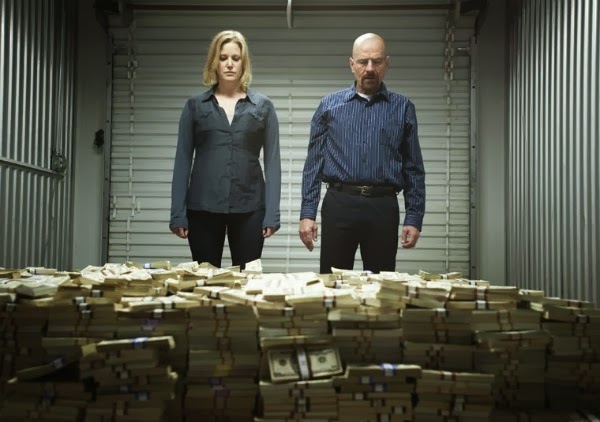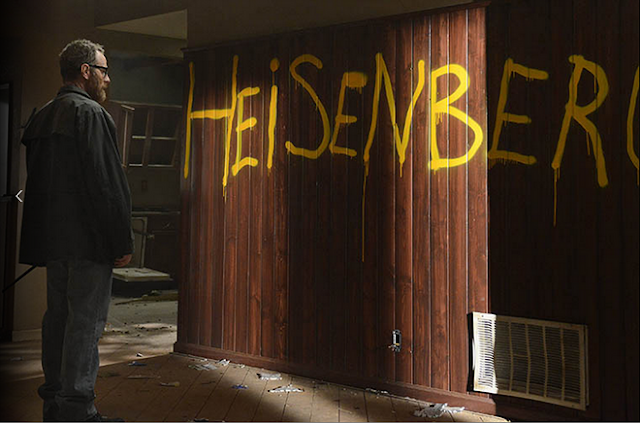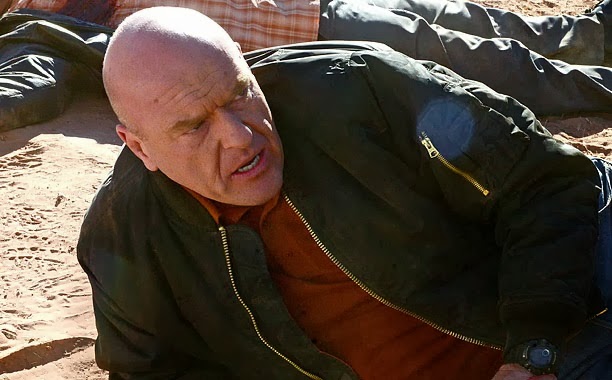It’s been funny, and sometimes surreal, reading the reaction to Breaking Bad this week…
I read some columns/reviews that sounded almost hysterical in their condemnation of Walter White, a fictional character on a TV show. They couldn’t believe how evil he was. They scoured their Thesaurus for words that could adequately describe the level of his evil. They wanted to make sure we knew “he’s NOT A HERO!” Presumably, in case we felt a sudden desire to shave our heads and start that meth lab in New Mexico we’ve been dreaming about. And if we identified or felt for him any way – or just found his downfall exciting – then we must be very sick individuals who really need to explore our conscience.
On Huffington Post, Maureen Ryan wrote a long, tedious column on the “Oxymandias” episode, breaking it down moment by moment like a pretentious English Literature professor at a third rate college. Helping us to “understand” it. Finding metaphors within metaphors, symbols within symbols. Basically rewriting it for us with her own private spin. As if we needed it explained, as if it’s not a piece of entertainment that either works (oh boy, did it) or doesn’t. It was one of the most self-indulgent, solipsistic pieces of crap I’ve ever read online. And she did it with no wit or sense of humor at all. But, the punchline was that she had somehow completely missed the point of the phone call scene towards the end of the episode. That’s when Walt spews vitriol at Skyler over the phone…then we realize, as Skyler does, that he is saying all of it for the benefit of the eavesdropping cops – in order to absolve his wife on record and keep her out of jail. There are multiple emotional layers to it, but there is no doubt Walt is putting on a performance. The writer of the episode verifies this herself in an interview. But Miss Professor Critic is so traumatized by his words that she doesn’t “get it” and calls it the ultimate show of Walt’s evil. All the subtle nuance and shades of grey (Walt’s tears, Skyler says “I’m sorry” and means it) that the writers have so painstakingly put into every episode of BB for the last six years totally eludes her.
Dozens of readers corrected her, told her to watch it again – so she writes ANOTHER long-winded column doubling down on her mistake and accusing her critics of being, essentially, wife-beaters.
As absurd as it sounds, that was the implication. We had become too attached to Walt and we were blind to the fact that he was a monster. His rant was bigger than we knew: It was the bile of a man (read: like all men) that has secretly hated his wife from the start. We were just too misogynistic ourselves to see clearly. That’s why we “attacked” her for her mistake.
When the truth is, just like Walt, her ego could not allow her to admit she was wrong.
Now, let me be clear. I am very aware there is a group of idiotic fanboys who have heaped abuse on Skyler’s character (and even worse, the actress) over the years simply because the woman didn’t want her family in the meth biz. That’s just stupid. And absolutely misogynistic. But I think the vast majority of the audience has plenty of sympathy for her dilemma. It’s just that Walt is our PROTAGONIST. He is our main character, the one we have been following from the start. We know more about him than even his wife does. We’ve seen him change. We’ve seen him do terrible things. And we’ve seen the humanity that still peeks through after all the carnage and destruction he’s caused – the chemistry teacher and family man still there underneath the goatee. So, of course we still feel for him. That’s the point! And there’s still some small part of us that hopes he succeeds in some small way even though we know he is doomed and deserves the certain death coming his way. Warner Brothers figured this out in the 1930’s. If a character dies at the end, he can do just about anything first – and we get to go along on the wicked ride, guilt free. Film & TV history is littered with anti-heroes, from Michael Corleone to Travis Bickle to Tony Soprano, who we find oddly compelling despite their flaws. Doesn’t make us all homicidal sickos.
(Although, I like to think Tony Soprano did a bullet dance in that diner before the Journey song ended. In my book, he was much worse than Walt. Now THAT was a misogynistic series)
What upsets me is this supposedly intelligent critic is denying the very complexity that this incredible series is built on, the moral ambiguity that has made it an instant television classic.
But she’s not the only one. I read several pieces with the same silly bent. By folks with the same apparent lack of viewing comprehension. TV has evidently gotten too smart for it’s own critics.
This guy at least makes a few good points before he gets carried away.
So why all the sudden finger-wagging moralism? Why do we need to be told by these people how we are supposed to feel about Walt and his tragedy? Have we become so PC and fragile that we can’t take a dark ride in the Tunnel Of Sin? Or is it just that everything is easier to digest in black and white?
Whatever the reason, I find it condescending.
Especially since Vince Gilligan and his writing staff have crafted The Perfect Final Season…
Along with all the gasps and twist & turns we’ve come to expect, they have surprised us with many moments where Walt proves to not be as far gone as we thought. When Hank shows up in the desert, Walt calls off the Nazis and tells them not to come. He surrenders. He yells for them not to shoot, even though he is in handcuffs and on his way to prison. Then he offers his entire fortune, 80 million dollars, to save Hank’s life. (One of these critics said this had more to do with his desire to “control people”. Oh shut up! He was desperately trying to save Hank’s life, period) Then he is devastated when Hank is killed. Not because it “lays bare his hypocrisy”, or any such intellectual bullshit, but because this guy was his brother-in-law and he had honestly believed he could keep his criminal deeds from coming back and hurting his own family.
Yeah, yeah, he turns really nasty on Jesse – because he, rightly AND wrongly, blames him for Hank’s death. But I don’t think that story is over. I have a feeling that machine gun in Walt’s trunk is going to save Jesse’s life, and that Jesse will be the last person Walt speaks to before he dies…
I think they’re going to give our monster a small measure of redemption.
I may be wrong. If so, I’ll be glad that Breaking Bad faked me out yet again.
I like Walt. He’s completely messed up, but I like him anyway.
Sue me.
And PS: It’s a fucking TV show.





